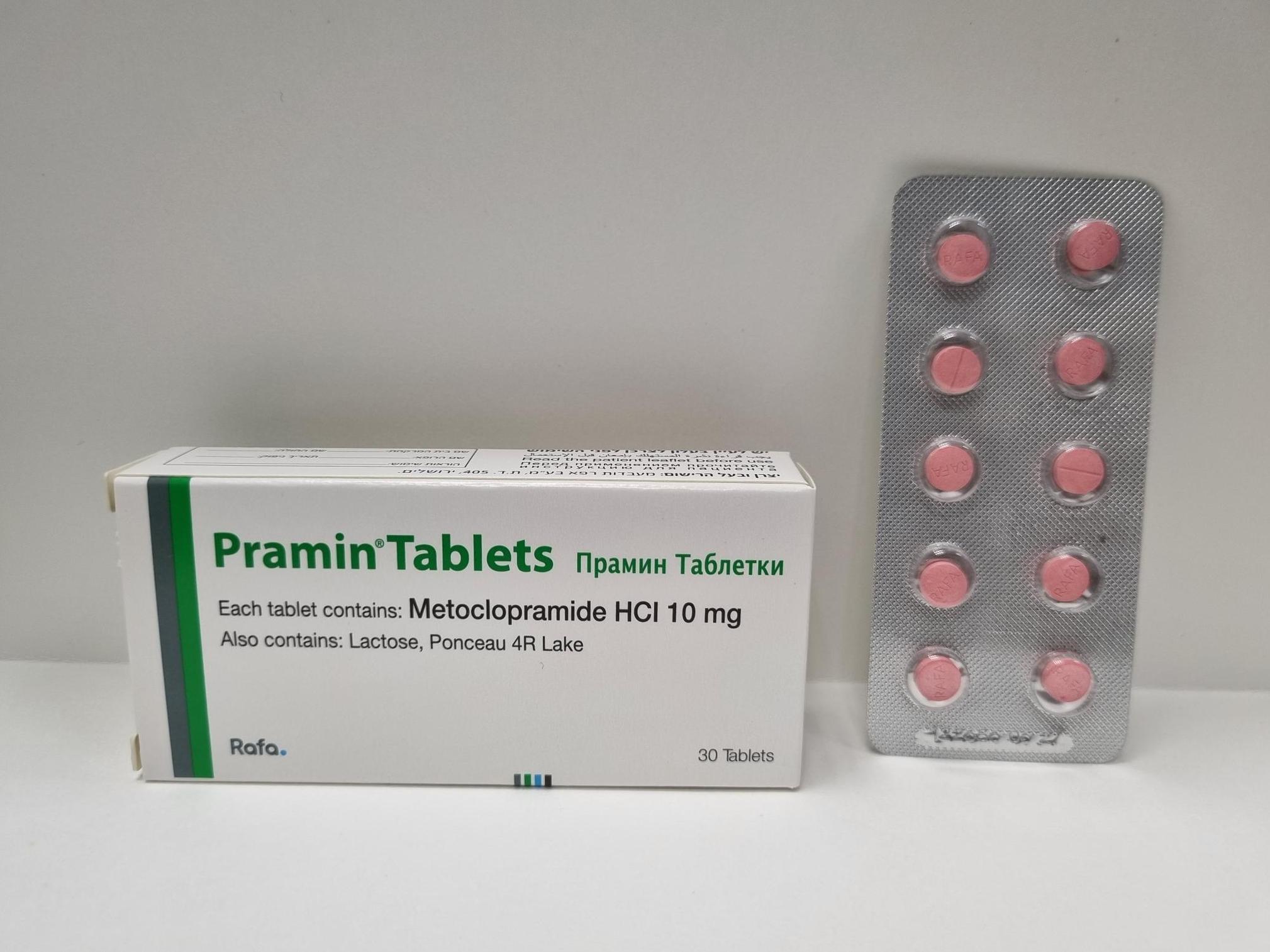Quest for the right Drug

פראמין טבליות PRAMIN TABLETS (METOCLOPRAMIDE HYDROCHLORIDE)
תרופה במרשם
תרופה בסל
נרקוטיקה
ציטוטוקסיקה
צורת מתן:
פומי : PER OS
צורת מינון:
טבליה : TABLETS
עלון לרופא
מינוניםPosology התוויות
Indications תופעות לוואי
Adverse reactions התוויות נגד
Contraindications אינטראקציות
Interactions מינון יתר
Overdose הריון/הנקה
Pregnancy & Lactation אוכלוסיות מיוחדות
Special populations תכונות פרמקולוגיות
Pharmacological properties מידע רוקחי
Pharmaceutical particulars אזהרת שימוש
Special Warning עלון לרופא
Physicians Leaflet
Special Warning : אזהרת שימוש
4.4 Special warnings and precautions for use Precautions: If vomiting persists the patient should be reassessed to exclude the possibility of an underlying disorder e.g. cerebral irritation. Neurological Disorders Extrapyramidal disorders may occur, particularly in children and young adults, and/or when high doses are used. These reactions occur usually at the beginning of the treatment and can occur after a single administration. Metoclopramide should be discontinued immediately in the event of extrapyramidal symptoms. These effects are generally completely reversible after treatment discontinuation, but may require a symptomatic treatment (benzodiazepines in children and/or anticholinergic anti-Parkinsonian medicinal products in adults). The time interval of at least 6 hours specified in the section 4.2 should be respected between each metoclopramide administration, even in case of vomiting and rejection of the dose, in order to avoid overdose. Prolonged treatment with metoclopramide may cause tardive dyskinesia, potentially irreversible, especially in the elderly. Treatment should not exceed 3 months because of the risk of tardive dyskinesia (see section 4.8). Treatment must be discontinued if clinical signs of tardive dyskinesia appear. Neuroleptic malignant syndrome has been reported with metoclopramide in combination with neuroleptics as well as with metoclopramide monotherapy (see section 4.8). Metoclopramide should be discontinued immediately in the event of symptoms of neuroleptic malignant syndrome and appropriate treatment should be initiated. Special care should be exercised in patients with underlying neurological conditions and in patients being treated with other centrally-acting drugs (see sections 4.3 and 4.5). Symptoms of Parkinson's disease may also be exacerbated by metoclopramide. Methemoglobinemia Methemoglobinemia which could be related to NADH cytochrome b5 reductase deficiency has been reported. In such cases, metoclopramide should be immediately and permanently discontinued and appropriate measures initiated (such as treatment with methylene blue). Cardiac disorders There have been reports of serious cardiovascular undesirable effects including cases of circulatory collapse, severe bradycardia, cardiac arrest and QT prolongation following administration of metoclopramide by injection, particularly via the intravenous route (see section 4.8). Special care should be taken when administering metoclopramide, particularly via the intravenous route to the elderly population, to patients with cardiac conduction disturbances (including QT prolongation), patients with uncorrected electrolyte imbalance, bradycardia and those taking other drugs known to prolong QT interval. Special care should be taken when administering metoclopramide intravenously to patients with ‘sick sinus syndrome' or other cardiac conduction disturbances. There have been very rare reports of abnormalities of cardiac conduction with intravenous metoclopramide. Metoclopramide should be used with care with other drugs affecting cardiac conduction. Metoclopramide should be used with caution in patients with hypertension, since there is limited evidence that the drug may increase circulating catecholamines in such patients. Renal and hepatic impairment In patients with renal impairment or with severe hepatic impairment, a dose reduction is recommended (see section 4.2). Other precautions Metoclopramide may cause elevation of serum prolactin levels. Because metoclopramide can stimulate gastro-intestinal mobility, the drug theoretically could produce increased pressure on the suture lines following gastro-intestinal anastomosis or closure (see section 4.3) Exipients with known effect Pramin® Tablets contain lactose. Patients with rare hereditary problems of galactose intolerance, total lactase deficiency or glucose-galactose malabsorption should not take this medicine. Pramin® Tablets contain Ponceau 4r lake which may cause allergic reactions. Care should be exercised when using metoclopramide in patients with a history of atopy (including asthma) or porphyria. Metoclopramide should not be used in the immediate post- operative period (up to 3-4 days) following pyloroplasty or gut anastomosis, as vigorous gastrointestinal contractions may adversely affect healing.
Effects on Driving
4.7 Effects on ability to drive and use machines Metoclopramide may cause drowsiness, dizziness, dyskinesia and dystonias which could affect the vision and also interfere with the ability to drive and operate machinery.

שימוש לפי פנקס קופ''ח כללית 1994
Nausea & vomiting, diabetic gastroparesis, gastrointestinal motility disorders, reflux esophagitis, hiccup
תאריך הכללה מקורי בסל
01/01/1995
הגבלות
תרופה שאושרה לשימוש כללי בקופ'ח
מידע נוסף
עלון מידע לצרכן
14.05.17 - עלון לצרכן אנגלית 13.04.22 - עלון לצרכן עברית 14.05.17 - עלון לצרכן ערבית 05.09.22 - עלון לצרכן אנגלית 05.09.22 - עלון לצרכן עברית 05.09.22 - עלון לצרכן ערבית 18.10.23 - עלון לצרכן עברית 09.04.24 - עלון לצרכן אנגלית 09.04.24 - עלון לצרכן עברית 09.04.24 - עלון לצרכן ערבית 15.03.17 - החמרה לעלון 13.04.22 - החמרה לעלון 18.10.23 - החמרה לעלוןלתרופה במאגר משרד הבריאות
פראמין טבליות